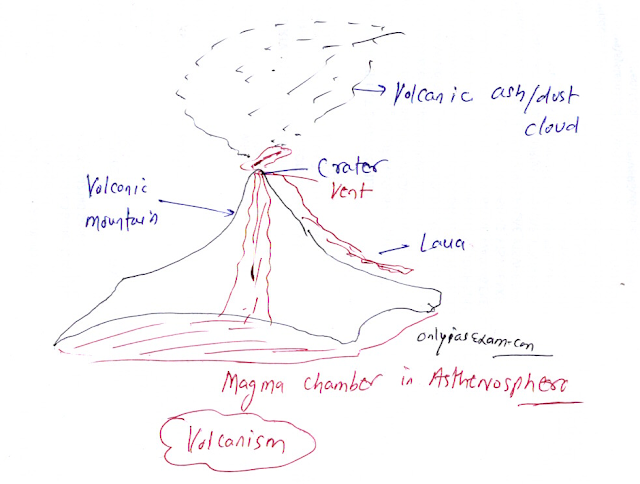Question.
Describe the influence of volcanism on man. ( 15 marks) (UPPSC 2021)
Answer.
Volcanoes are a kind of endogenic force and it is also a natural disaster. Through volcanoes, an opening in the earth's crust allows hot lava (lava we call magma when it is inside the earth), dust, hot gases, water vapor, etc., to come up on the earth's surface and also go to the atmosphere.
Influence of Volcanism on Humans:
Volcanism influences both positively and negatively human beings.
The positive impact of Volcanism on Man:
The following are the positive effects of volcanoes on humans:
- Volcanoes form many new landforms such as crater lakes, volcanic plateaus, and volcanic mountains.
- It brings valuable elements such as gold, iron, nickel, and magnesium from the asthenosphere to the Earth's surface. For example, the Johannesburg gold deposits in South Africa and the Sudbury nickel deposits in Canada are examples of volcanic deposits.
- Igneous rock is formed after the cooling of lava, which is used for various activities like construction.
- Volcanoes provide us with fertile land. The accumulation of volcanic dust and ash makes the land fertile. For example, the black soil of the Deccan Traps and the fertile lands of the Java Islands are formed by volcanoes.
- It also creates beautiful scenery and thereby attracts tourists.
- It also provides a lot of information about the interior of the Earth.
- It provides information about the state of tectonic plate boundaries and the motion of plates.
- It is also a potential source of geothermal energy. Several countries such as the United States, Russia, Italy, and Japan are producing geothermal energy.
The negative impact of volcanism on humans.
The following are the negative effects of volcanoes on humans:
- Volcanic dust and gases make the atmosphere opaque, making air transport difficult, increasing respiratory disease, and preventing insolation from reaching the Earth's surface (it cools the Earth).
- The accumulation of lava in the area, makes the land porous, due to which there is a shortage of water in the area.
- The sudden eruption of volcanoes causes damage to human settlement, human life, and property. For example, Mount Vesuvius (which formed from a volcanic eruption) destroyed the city of Pompeii in Italy in 78 AD.
- If there is an eruption of volcanoes in the sea, it heats the surrounding water, which adversely affects the aquatic life there.
You may like also:
- UPPSC Geomorphology: (भू- आकारिकी) PYQ Solutions
- ज्वालामुखी के मानव पर पड़ने वाले प्रभाव का वर्णन कीजिए।

ConversionConversion EmoticonEmoticon